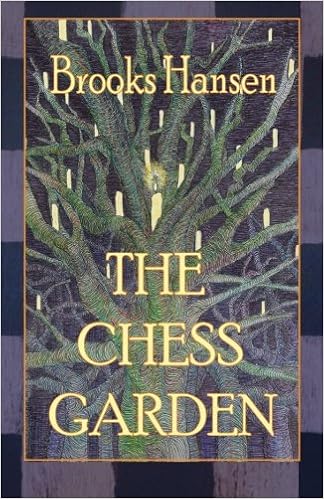Dear Sonja,
How is one to know, I wonder, if a backgammon counter is sleeping, or if its only resting? If it is dreaming or daydreaming, and what of its dreams--what must they contain? Beside me lies the answer--polished, red, round, and perfectly still--a young counter and my newest friend. Still, I haven't the faintest idea if it is napping now, or listening in as I compose my thoughts for you.
Once every few weeks, the adults and children of Dayton, Ohio gather in the Chess Garden of Mrs. Sonja Uyterhoeven--so called because it has long been a place where people of all ages have gathered to play chess and other games, using the many sets that the Uyterhoevens have collected over the years--to listen to the latest letter from Sonja's husband Gustav, who has set off to visit a mysterious land called the Antipodes. The Antipodes, he writes, are inhabited by sentient game pieces. Most of those he meets are chess figures, but also checkers, dice, and backgammon counters. And from time to time, as if heralding a letter about to arrive, mysterious chess pieces appear in the garden, too.
The letters themselves are terrific fantasy, borrowing equally from Tolkien and Lewis Carroll. Dr. Uyterhoeven's letters contain no end of arresting images: a dripping tree of candles, making wax stalacites; a chasm of rolling, colliding dice that forces the hands of chance; a group of monks piecing together fallen leaves like a puzzle. Uyterhoeven's letters tell how he meets Eugene, the keeper of "goods"--that is, objects that embody the essence of their type. Break the "good" ladder, and everyone in the Antipodes might forget what a ladder is and what it is for. Uyterhoeven becomes caught between two forces in the Antipodes, one who wants to protect these goods, and a cabal of shadowy figures who wants to collect and break them all, sending the Antipodes into a kind of forgetful infancy.
These letters take up about half the novel; the rest is the story of Dr. Uyterhoeven's life. We learn that he is a famous Dutch physician who comes under fire for supporting homeopathic medicine. In a world of rationalism, Uyterhoeven is a vitalist, one who believes that life is an animating force separate from biology or phyiscs. He objects not only to the prevailing medical ideas of pathology but the very idea of cause itself. The letters from the Antipodes are a kind of expression of these ideals, exploring the possibility of bridging reason and the spirit, which is apart from words. Could destroying the words, and getting down to the spirit of things, be an invigorating moment, rather than a terrifying one?
Dr. Uyterhoeven isn't in the Antipodes, of course; he's in South Africa, treating those ravaged by the onset of the Boer Wars. He's old enough to know that he won't return from such a trip, and the letters are a last link to his community, and his wife, the mother of a son who died in childhood. This loss informs everything about the letters, which are in the idiom of children, those who the Doctor has devoted his late life to teaching chess. But the message is really to Sonja, and their message of linking the reasoning to the spiritual world is meant to preserve their connection to each other, and to their lost son.
A while back I asked my friends a question: What's the best book you've read that no one else you know has read? This is the first response I got--from my friend Greg--that I've gotten around to reading, and I'm glad I did. The Chess Garden manages a fine balance of whimsy, pathos, and deep intelligence that is rare.


No comments:
Post a Comment